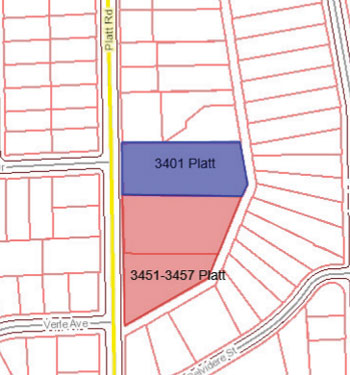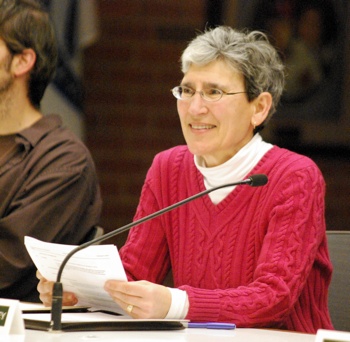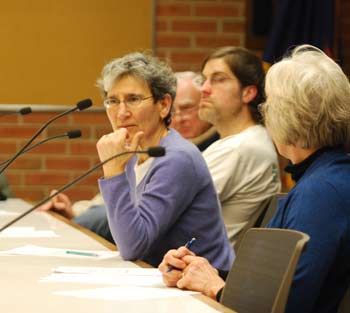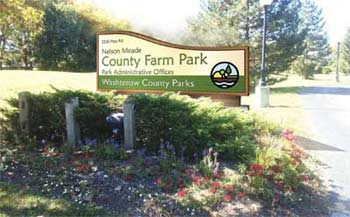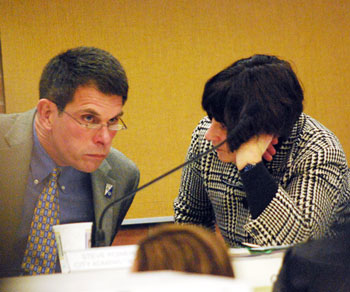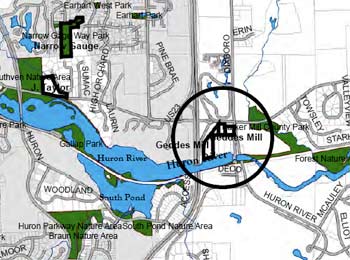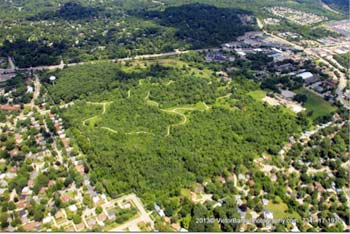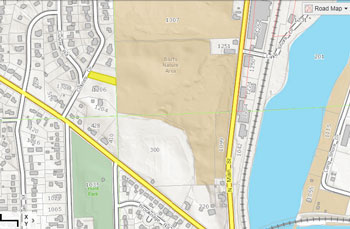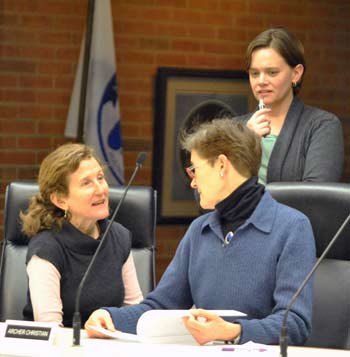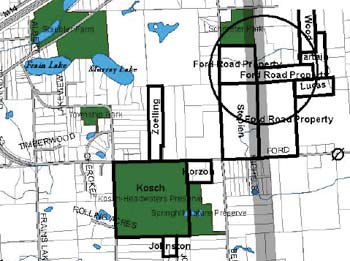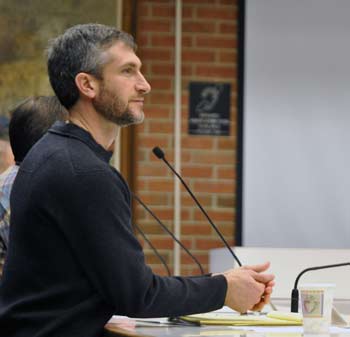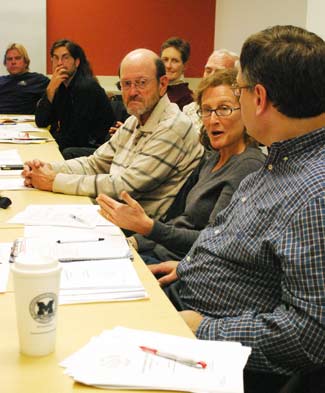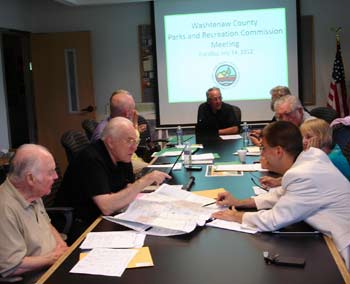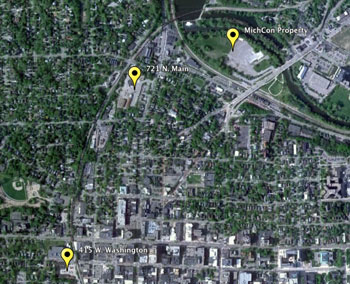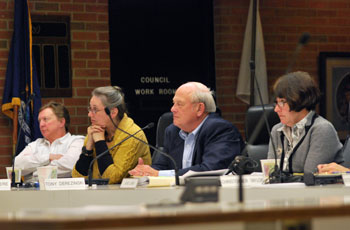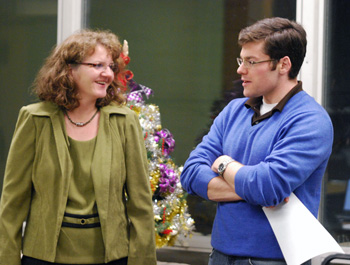Ann Arbor city council meeting (Jan. 6, 2014): On a bitter cold night, Ann Arbor city councilmembers ended their first regular meeting of the year with an item not originally on their agenda. They passed a resolution that directs city administrator Steve Powers and city attorney Stephen Postema to gather information to help the city council determine whether to purchase the 16.7-acre Edwards Brothers Malloy property on South State Street.

Graph from weatherspark.com showing the -12 F temperature at the start of the Jan. 6, 2014 city council meeting. (Image links to weatherspark.com)
The direction came after the city council met in a closed session for about half an hour. Councilmembers emerged to craft and then pass the resolution. It gives direction to explore options to make the purchase financially feasible. That means finding a way to finance a $12.8 million deal. The sale of the Edwards Brothers property on South State Street is currently pending to the University of Michigan for $12.8 million, in an agreement that was announced in a Nov. 27, 2013 press release. The business – a fourth-generation Ann Arbor publishing and printing firm – had signaled its intent to put the property on the market in late July.
The topic of the possible land acquisition ties in to an upcoming Jan. 13 city council work session about economic development.
At the start of the Jan. 6 meeting, the council got an update from three key staff members about the city’s response to the snowstorm that had hit the entire Midwest over the weekend.
From public services area administrator Craig Hupy they heard an update on snowplowing, which was continuing during the meeting. From police chief John Seto, they heard an update on the police department’s support for relocating residents of a housing complex after a water pipe burst. And from Mary Jo Callan, Washtenaw County’s director of the office of community and economic development, they heard an update on efforts to address the needs of the homeless population during the freezing weather.
Concern for how the homeless were faring was the topic of eight out of nine speakers who signed up for public commentary reserved time.
In its regular business agenda, the council dispatched two items leftover from its last meeting of 2013. One of those items was the official termination of a four-year-old memorandum of understanding with the University of Michigan for construction of the Fuller Road Station project. That item was voted through with little controversy, although mayor John Hieftje compared it to digging someone up who died a couple of years ago and re-burying them.
Fuller Road Station was a planned joint city/University of Michigan parking structure, bus depot and possible train station located at the city’s Fuller Park near the UM medical campus. The council had approved the MOU on Fuller Road Station at its Nov. 5, 2009 meeting on a unanimous vote. However, a withdrawal of UM from the project, which took place under terms of the MOU, was announced on Feb. 10, 2012.
The other item delayed from last year was a resolution assigning a specific cost to the removal of on-street metered parking spaces, in connection with future developments: $45,000 per space. That amount was based on the cost of constructing a new parking space in a structure. After the policy was amended during the Jan. 6 meeting, it included a requirement that lost revenue also be compensated, based on projections of revenue for the space for the next 10 years. An average parking meter in the system generates $2,000 in annual income.
Apart from those previously delayed items, the rest of the council’s agenda was mainly filled with future development.
Accounting for two of the council’s Jan. 6 voting items was Traverwood Apartments – a First Martin development on the city’s north side. The site is located on the west side of Traverwood Drive, north of Plymouth Road. The council gave final approval of some rezoning necessary for the complex of 16 two-story buildings. And on a separate vote, the council gave site plan approval and a wetland use permit associated with the apartment complex.
The council also approved the upward expansion of the Montgomery Ward building on South Fourth Avenue in downtown Ann Arbor. The estimated $3.8 million project will expand the existing 17,273-square-foot building – a former Montgomery Ward’s department store – to 38,373 square feet, with housing on the second through fifth floors.
And finally, the council approved the site plan and development agreement for two restaurants at Briarwood Mall. The restaurants – one at 6,470 square feet, the other at 7,068 square feet – will be constructed on the east side of the Macy’s building. The restaurants would be operated by two chains: P.F. Chang’s and Bravo! Cucina Italiana.
As part of the consent agenda, the council approved agreements with Sprint for placing antennas at four facilities: the Plymouth Road water tower, the Manchester Road water tower, the Ann-Ashley parking structure, and the water treatment plant on Sunset Road. The contracts are being revised upwards to $45,000 a year at each location, with 4% annual escalators.
The council also approved appointments to the Ann Arbor Summer Festival board of directors.
Members of a pedestrian safety task force, established late last year, were also nominated at the meeting. A confirmation vote will come at the council’s meeting on Jan. 21. Related at least indirectly to that, city administrator Steve Powers has provided the council with the first part of his response to the council’s direction in connection with the city’s updated non-motorized transportation plan. [Full Story]




